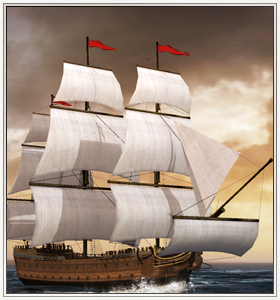Difference between revisions of "Admiral's Flagship, 3rd Rate (ETW Unit)"
Tango12345 (talk | contribs) (updating to final standard) |
(→Tactics) |
||
| Line 6: | Line 6: | ||
Historically, many admirals and commodores chose 74s to be their flag vessels. In the 18th Century “commodore” was not a formalised naval rank, but an appointment as a “temporary fleet commander”. Appointing a commodore allowed the navy to choose any talented or well-connected captain, no matter how junior, for command. Admiral was usually a rank that any captain, no matter how useless, could reach if he lived for long enough! | Historically, many admirals and commodores chose 74s to be their flag vessels. In the 18th Century “commodore” was not a formalised naval rank, but an appointment as a “temporary fleet commander”. Appointing a commodore allowed the navy to choose any talented or well-connected captain, no matter how junior, for command. Admiral was usually a rank that any captain, no matter how useless, could reach if he lived for long enough! | ||
| − | == | + | ==Details== |
These vessels share all the benefits of their standard 3rd Rate brethren in that they are comparatively cheap to build and maintain, and yet have good handling and firepower available to them. As such, these vessels are excellent for protecting trade, as they will happily out-gun any pirate vessel, and a large majority of other warships as well. The Flagship variant also has better defence and morale, providing a strong core for any medium sized fleet. As such, these vessels should be sought after by a nation with aspiring naval ambitions as a matter of some urgency. | These vessels share all the benefits of their standard 3rd Rate brethren in that they are comparatively cheap to build and maintain, and yet have good handling and firepower available to them. As such, these vessels are excellent for protecting trade, as they will happily out-gun any pirate vessel, and a large majority of other warships as well. The Flagship variant also has better defence and morale, providing a strong core for any medium sized fleet. As such, these vessels should be sought after by a nation with aspiring naval ambitions as a matter of some urgency. | ||
Revision as of 10:19, 10 October 2011
 The third rate is a compromise between firepower and handling. A stable gun platform, it also makes a good flagship.
The third rate is a compromise between firepower and handling. A stable gun platform, it also makes a good flagship.
Overview
Overall, the “74” (from the number of guns carried) or “third rate” is a very practical vessel. With a crew of around 700 men, it has enough firepower and resilience to survive most battles. It can deliver a horrendously effective broadside from its 32-pounders (on the lower deck), 18-pounders on the upper deck and 9-pounders in the upper works. It also has enough space to house an admiral and his busy staff in some comfort, even if the ship’s officers have to sacrifice their living space.
Historically, many admirals and commodores chose 74s to be their flag vessels. In the 18th Century “commodore” was not a formalised naval rank, but an appointment as a “temporary fleet commander”. Appointing a commodore allowed the navy to choose any talented or well-connected captain, no matter how junior, for command. Admiral was usually a rank that any captain, no matter how useless, could reach if he lived for long enough!
Details
These vessels share all the benefits of their standard 3rd Rate brethren in that they are comparatively cheap to build and maintain, and yet have good handling and firepower available to them. As such, these vessels are excellent for protecting trade, as they will happily out-gun any pirate vessel, and a large majority of other warships as well. The Flagship variant also has better defence and morale, providing a strong core for any medium sized fleet. As such, these vessels should be sought after by a nation with aspiring naval ambitions as a matter of some urgency.
Factions
 Great Britain
Great Britain United Provinces
United Provinces Afghanistan
Afghanistan Austria
Austria Barbary States
Barbary States Bavaria
Bavaria Dagestan
Dagestan Gran Colombia
Gran Colombia Courland
Courland Denmark
Denmark France
France Genoa
Genoa Georgia
Georgia Greece
Greece Hannover
Hannover Hessen
Hessen Hungary
Hungary Ireland
Ireland Knights of St. John
Knights of St. John Louisiana
Louisiana Mamelukes
Mamelukes Maratha Confederacy
Maratha Confederacy Mexico
Mexico Morocco
Morocco Mughal Empire
Mughal Empire Mysore
Mysore Naples & Sicily
Naples & Sicily New Spain
New Spain Norway
Norway Ottoman Empire
Ottoman Empire Italian States
Italian States Savoy
Savoy Poland-Lithuania
Poland-Lithuania Portugal
Portugal Prussia
Prussia Punjab
Punjab Quebec
Quebec Russia
Russia Persia
Persia Saxony
Saxony Scotland
Scotland Spain
Spain Sweden
Sweden Thirteen Colonies
Thirteen Colonies United States
United States Venice
Venice Westphalia
Westphalia Württemberg
Württemberg
